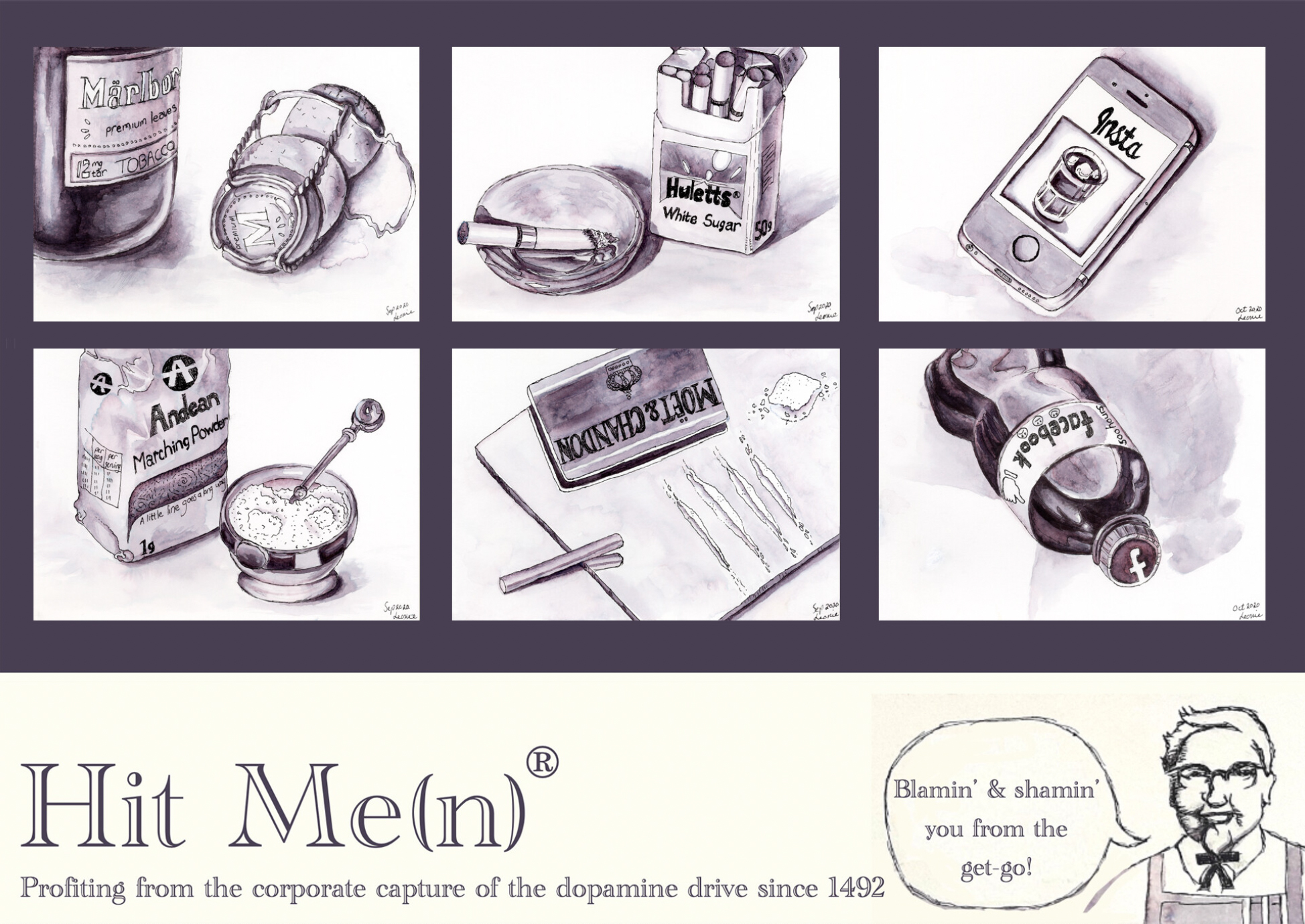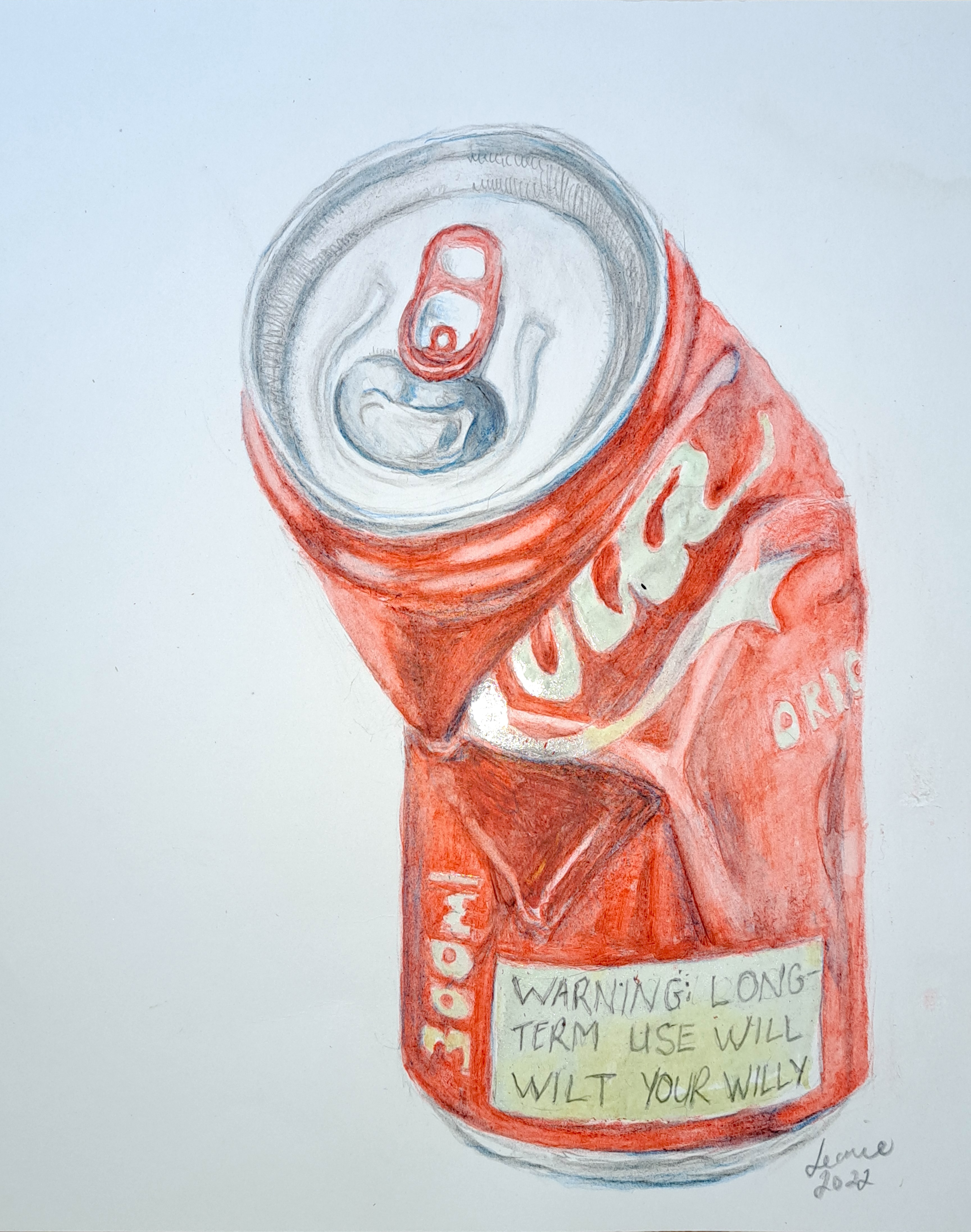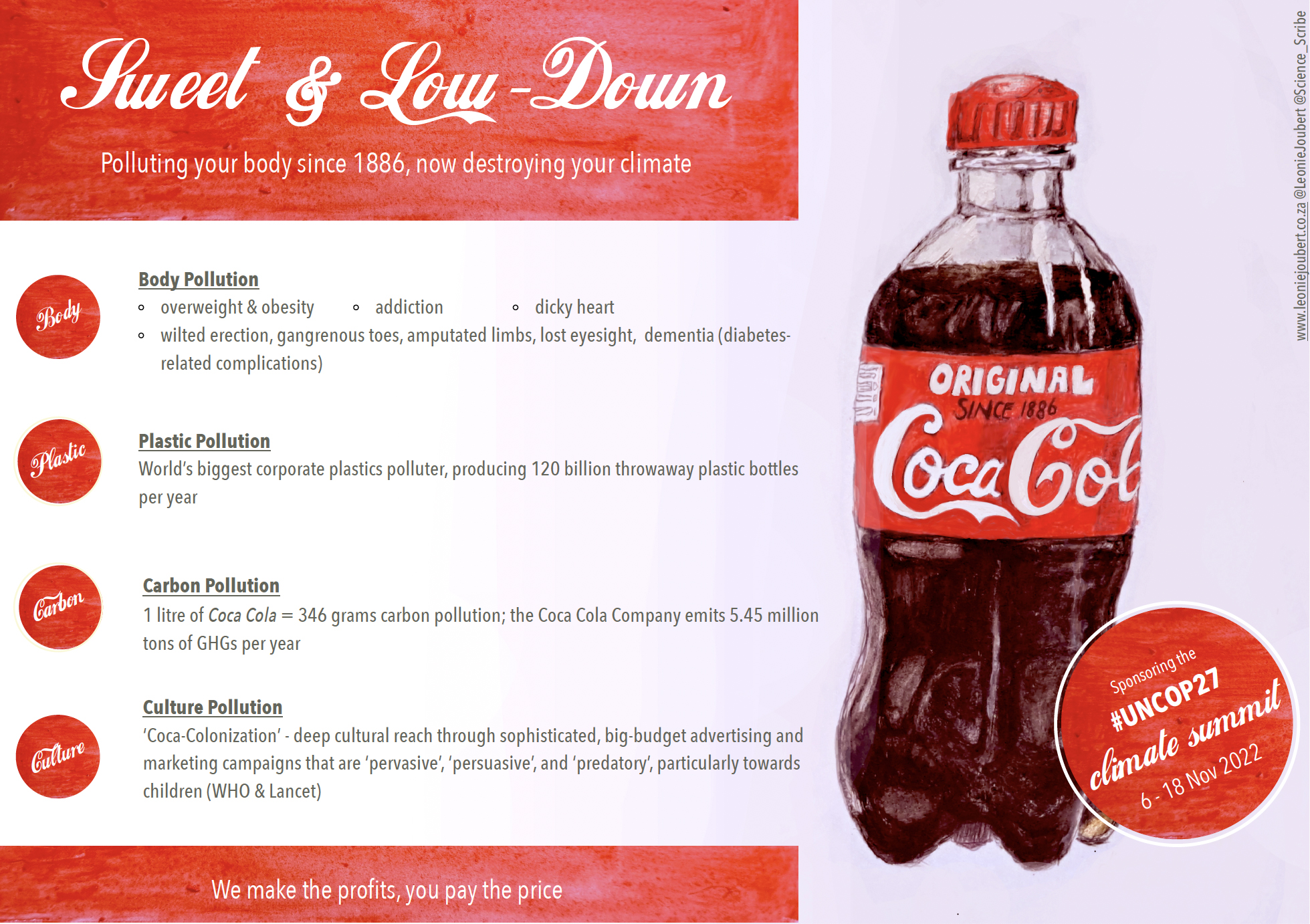Step aside, Cristiano Ronaldo, Mavis is the real face of Coca-Cola. Although she’d never have made it onto a flashy billboard alongside one of the biggest names in history — Coke, that is, not Ronaldo — because Mavis was too ordinary, she was too statistically average.
Like most South Africans in her shoes, Mavis (not her real name) was either going to be taken out by a good old-fashioned case of consumption, or diabetes would get her.
In the end, it came down to a gammy foot.
A nasty little sore became a septic ulcer because that’s what happens when years of diabetes shrivel the veins to our feet and starve a wound of blood flow. The nurses in the Khayelitsha clinic where she lived said she’d left it too late this time: her foot would have to come off. Horrified, Mavis did what many of us do when we panic. Nothing. The infection spread. By the time her brother had done a 2,000 km round-trip to rush her into care in her home town in the Eastern Cape, it was too late.
She died the mundane death of someone in penury, and her family lost their last breadwinner. She was around 50 years old.
It’s hard to know if Mavis made it into the official death count — diabetes is now the second-leading cause of death in the country after tuberculosis, afflicts 12% of adult South Africans, and costs the economy R2.7-billion a year — or if the national balance sheet will notice her trifling income lost to the economy. Her family certainly will feel the missing food from their plates.
But while public health experts keep reminding us that this kind of malady is the ‘normal response by normal people to an abnormal environment’ — to quote The Lancet’s 2011 special report on obesity — their best efforts can’t seem to upend the sterling job by Big Sugar and Big Food’s spin doctors that has convinced us otherwise. One part of this abnormal environment, The Lancet reminds us, is the misleading and sometimes outright deviously deceptive messaging around sugary drinks and fast foods.
By all accounts, Mavis did eat a poor diet, with lots of sugar, and so she died from a disease of lifestyle. It was self-inflicted, right? She sugared herself into an early grave.

The artwork Hit Me(n) begs the question: who’s responsible for the fallout of our addiction, the person craving their next hit, or the corporates profiting from pushing their products on us? (Illustration: Leonie Joubert)
Spin it till you win it
This is what the Coca-Colas of the world will have us believe: that sugar-bloated diets, and sugary drinks in particular, have nothing to do with the fever of diabetes and obesity sweeping the world, particularly in the Global South where these are no longer diseases of the affluent, but a contagion for the poor.
It’s not their product that’s the problem — our behaviour towards the product is the issue, apparently.
We just need to exercise a bit of willpower, Big Sugar tells us, don’t overdo it on their products, and go for a trot around the block every now and then. That way we’ll escape the extra padding that could eventually steal our eyesight, starve our fingers and toes of air so they rot with gangrene, strangle blood flow to our penis and wilt our erection, and even slam the shutters closed on our brain function.

Honest advertising: what an evidence-based message about the health outcomes of regular Coca-Cola use should say. (Illustration: Leonie Joubert)
If we exert our better, self-controlled selves, Coca-Cola tells us, we too can be a Ronaldo: lean, fit, and fabulously famous. If we give in to our base nature — if we’re lazy and greedy — well, that’s on us.
Before Ronaldo found some backbone and snubbed Coca-Cola at a football press conference in 2020 (‘Drink water’, he said, pushing aside two bottles of Coke), he was complicit in a century-old propaganda campaign that has allowed one of the biggest polluters on the planet to launder its image, shirk responsibility for its pollution, and make obscene amounts of profit off of our addiction to its product. Profit which it pours back into the spin cycle, rinsing out any stains left by the mounting body of public health data showing sugary drinks’ role in obesity and diabetes, while blaming the Mavises of the world for eating themselves hungry, heavy, and sick.
Rinse and repeat.
Behind every one of these big brands are the magicians working their conjuring tricks.
Lies, damn lies, and advertising
The Oxford Dictionary defines propaganda as the “systematic dissemination of information, esp. in a biased or misleading way… to promote a particular cause or point of view”.
A century ago, before the Nazis gave the term a bad name, behavioural psychologist Edward Bernays was making an art form of it. Bernays, who had learned at the feet of his uncle Sigmund Freud, was part of the World War 1 Western propaganda machine. He quickly realised how this particular brand of communications trickery — cleverly worded information that’s not necessarily true — could be used by corporates to build their empires.
‘Propaganda’ just needed an image overhaul.
Enter, the dark arts of ‘public relations’ — yes, that’s how Bernays reframed it — and what followed was a century of refining an industry whose contribution to society is to use psychologically sophisticated techniques to deliver often misleading or downright false messaging in order to manipulate us into buying things that make their already rich clients even wealthier and more powerful, the cost to society or the planet be damned.
Years of public health data show unequivocally that the advertising and marketing of fizzy drink brands drive their overconsumption. The research is also blindingly clear: another Lancet report — so dusty with time, it’s hard to believe we still have to remind ourselves of an evidence-based medical consensus that is this established — calls these marketing tactics ‘persuasive’, ‘pervasive’, and even ‘predatory’. This is particularly true for how these big brands target children, says the report.
Sophisticated advertising and marketing techniques, supported by staggering budgets, have buffed these corporates and their headline brands’ images to such a gleaming finish that Big Food and Big Sugar’s feverish spread across the globe has got a name in public health circles: the Coca-Colonisation and the McDonaldisation of our food culture.
A 2012 World Health Organisation report describes how brands like Coca-Cola extend their reach through our cultural fabric using “service-related marketing, television and movie tie-ins, sports sponsorship, music event and product sponsorship, educational competitions, and philanthropy”.
If ever the Coca-Cola brand had an Everest summit propaganda moment, it was at last year’s United Nations climate summit in Egypt, COP27, where Coca-Cola was the headline sponsor.

Coca Cola, one of the biggest plastics polluters on the planet and profiting from its part in the fossil fuel value chain, was the headline sponsor of the United Nations climate summit in Egypt last year, COP27. (Illustration: Leonie Joubert)
Coca-Cola must be one of society’s biggest planetary polluters. Long-term exposure to its addictive, zero-nutrient contents results in a toxic spill of obesity and diabetes, along with all the dreadful body-rotting consequences.
The Coca-Cola Company is also the world’s biggest corporate plastic polluter, according to a 2021 plastic audit, churning out 120 billion single-use plastic bottles yearly, 99% of which are made from fossil fuels.
For every 1 litre of Coca-Cola coming off the production lines, 346 grams of carbon pollution gets dumped into the atmosphere, according to the Wall Street Journal. The Coca-Cola Company is allowed to treat the skies above us like an open sewer, pouring 5.45 million tons of greenhouse gas emissions into it each year and washing its hands of the consequences, be it destabilising one planet’s climate or causing gangrene to one person’s foot.
From misinformation to moral ‘war crimes’
Just like Big Tobacco, Big Sugar, Big Food and Big Oil are playing from the same propaganda playbook, using the public relations laundering machine to discredit or downplay the science showing the health or environmental wreckage created by their products.
The PR wizardry might be a simple sleight of hand: as subtle as insinuating that necking another bottle of Coca-Cola will make us as fit as Ronaldo. It might be the kind of outright lies that have stoked climate denial, even as the fossil fuel big boys have known for 30 years that carbon pollution will destabilise the climate to the point of societal collapse.
Read more in Daily Maverick: COP28 news hub
The spin doctors did quite a number on this year’s fossil fuel trade show in Dubai — sorry, the UN climate summit, COP28 — as climate reporter Amy Westervelt documents with her extensive coverage. Although this isn’t a surprise. It comes after decades of calculated, well-funded communications campaigns by fossil fuel interests which have kept us on a path towards unimaginable suffering, so that they can keep pocketing their profits. (Westervelt’s podcast Rigged gives a deep dive into this.)
Al Gore calls this the moral equivalent of a war crime.
There isn’t much time for course correction. The world’s best scientists told us back in 2018 that we had one decade to throw society into a handbrake turn and avoid flying through the 1.5°C guardrail of global heating that would send us hurtling into a meteorological multi-car pileup. We’ve missed that goal now, and are still heading, tyres screeching, towards 3°C.
The PR industry can redeem itself, but it needs to break its Faustian deal with its paymasters, and repurpose its gifts for the common good, to help shift the cultural and political discourse towards one where we work together to disrupt what has brought us to this point. Clean Creatives and Creatives for Climate are leading the charge.
One parting shot as a reminder of how effective and pernicious the PR wizards are, a story from the Red Cross Children’s Hospital in Cape Town.
A primary healthcare research nurse once asked an outpatient mother why she was giving her weaning infant fizzy ginger beer.
Well, answered the mum, ginger beer will make her baby big and strong. You know, like the boxer on the billboard in town. DM


















 Become an Insider
Become an Insider
Absolutely right. This kind of advertising has nothing at all to do with free speech. It is maximisation of profits at the expense of individuals and the wider society.
Indeed!
Are you sponsored by Pepsi-Cola?
The lack of comments to this very important article shows that the majority of humans re just too apathetic to take the right action.
This article should be discussed in all elementary schools around the planet.
There is one consolation. After human kind has disappeared, the planet will heal itself.
The author mentions Coca-Cola or Coke at least 15 times. It is also featured prominently in 2 of 3 graphics. No other sugar seller features at all – not Pepsi, not Cadbury’s, not Mars bars, not Herschey bars … why would a discussion of Coca-Cola help elementary school kids?
In my opinion, this article only works if you accept the subconscious bias that people, especially the poor, are unable to make their own rational choices for themselves. Only then would the company be a potential villain. But if you hold all people equal, then you should also hold all people equally responsible for their choices. The rights and responsibilities come attached to one another. I don’t agree with the choices Mavis (not her real name) made, but I respect her right to have made them. In my opinion, demonizing the company for her choices, is a cheap shot.
Mostly true—it’s not entirely the company’s fault. They are operating almost entirely within the allowable limits of advertising and marketing.
The outcry should be with our governments. They literally hold all the power. That includes the power to restrict how sugary beverages are marketed but also sold
It also includes the power to tell them they can’t produce or sell single use plastics, and the power to make them adopt glass bottles + a deposit/reuse system.
So while this article was about corporate abuses—of which there are many—I was surprised at the absence of government inaction.
“By the time her brother had done a 2,000 km round-trip to rush her into care in her home town in the Eastern Cape, it was too late.”
So, in many ways, it’s not Coke that killed her, it’s the ANC.
Never forget…in South Africa more than in most democracies one single party has controlled all reins of the country for a generation.
All of the challenges we face currently are because of the ANC.
And …. what did we have before ‘democracy’ ? Maybe you and your ilk are missing those ‘good old days’ ? Instead of just “running man” … get ready to sprint .. to Orania . And if you get there … get a proper ‘education’ also. Even post ANC .. we won’t get heaven on earth !